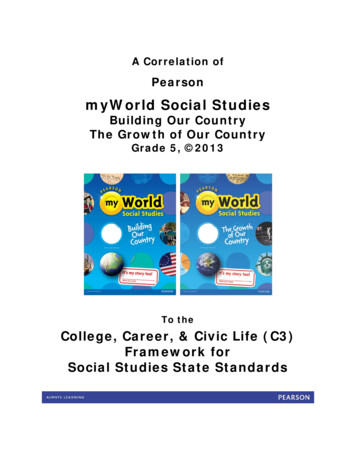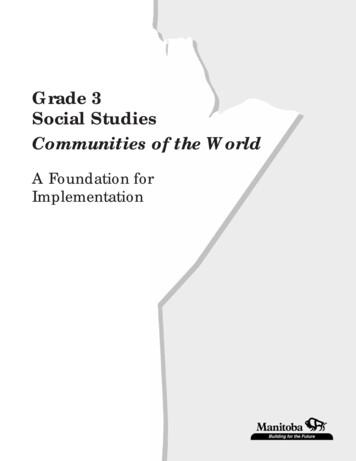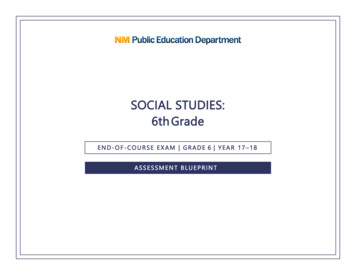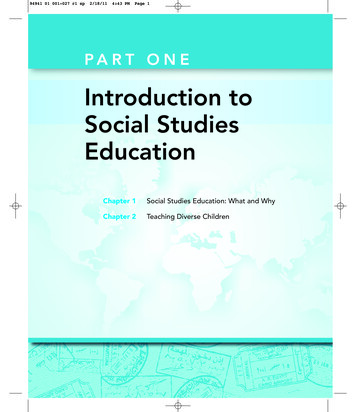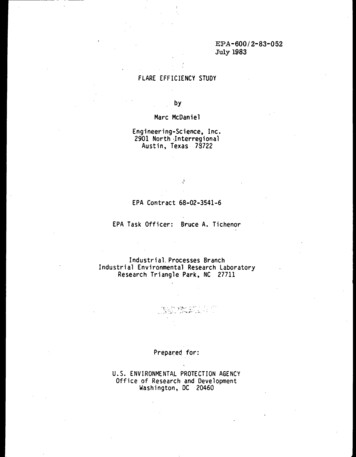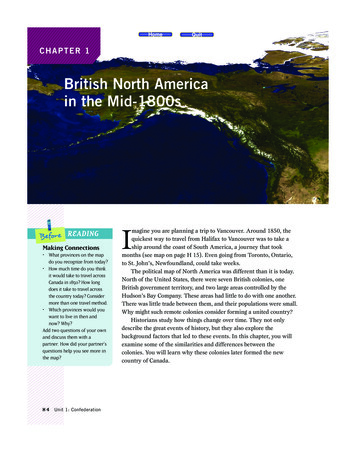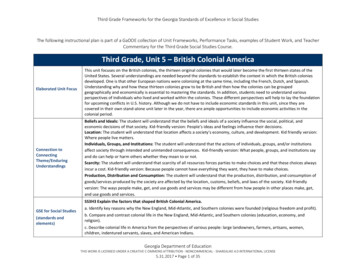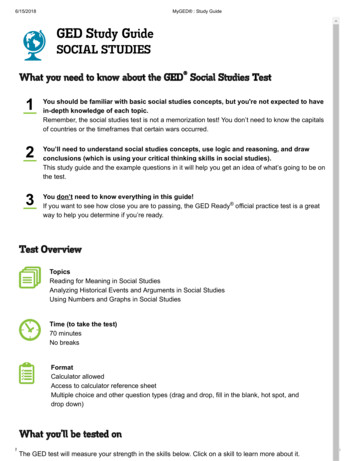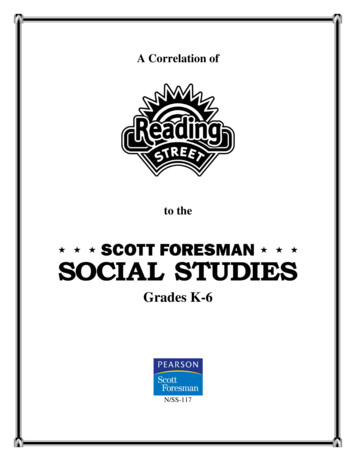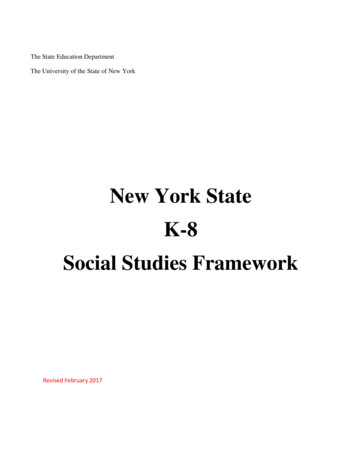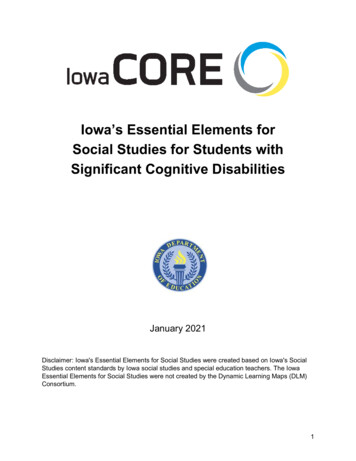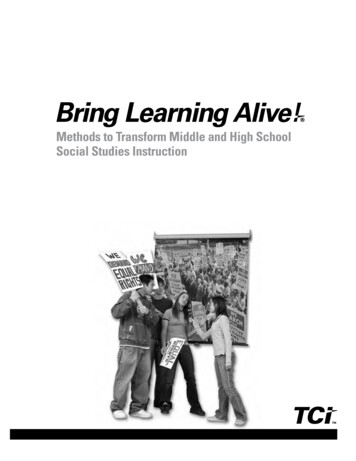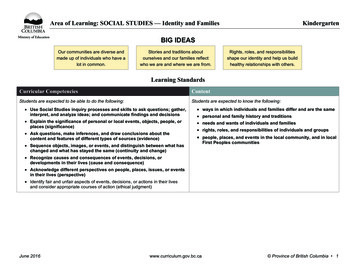
Transcription
Area of Learning: SOCIAL STUDIES — Identity and FamiliesMinistry of EducationKindergartenBIG IDEASOur communities are diverse andmade up of individuals who have alot in common.Stories and traditions aboutourselves and our families reflectwho we are and where we are from.Rights, roles, and responsibilitiesshape our identity and help us buildhealthy relationships with others.Learning StandardsCurricular CompetenciesContentStudents are expected to be able to do the following:Students are expected to know the following: Use Social Studies inquiry processes and skills to ask questions; gather,interpret, and analyze ideas; and communicate findings and decisions ways in which individuals and families differ and are the same Explain the significance of personal or local events, objects, people, orplaces (significance) needs and wants of individuals and families Ask questions, make inferences, and draw conclusions about thecontent and features of different types of sources (evidence) personal and family history and traditions rights, roles, and responsibilities of individuals and groups people, places, and events in the local community, and in local Sequence objects, images, or events, and distinguish between what haschanged and what has stayed the same (continuity and change)First Peoples communities Recognize causes and consequences of events, decisions, ordevelopments in their lives (cause and consequence) Acknowledge different perspectives on people, places, issues, or eventsin their lives (perspective) Identify fair and unfair aspects of events, decisions, or actions in their livesand consider appropriate courses of action (ethical judgment)June 2016www.curriculum.gov.bc.ca Province of British Columbia 1
Area of Learning: SOCIAL STUDIES — Local CommunitiesMinistry of EducationGrade 1BIG IDEASWe shape the local environment,and the local environment shapeswho we are and how we live.Our rights, roles, and responsibilitiesare important for buildingstrong communities.Healthy communities recognize andrespect the diversity of individualsand care for the local environment.Learning StandardsCurricular CompetenciesContentStudents are expected to be able to do the following:Students are expected to know the following: Use Social Studies inquiry processes and skills to ask questions; gather,interpret, and analyze ideas; and communicate findings and decisions characteristics of the local community that provideorganization and meet the needs of the community Explain the significance of personal or local events, objects, people, orplaces (significance) diverse cultures, backgrounds, and perspectives within thelocal and other communities Ask questions, make inferences, and draw conclusions about the contentand features of different types of sources (evidence) relationships between a community and its environment Sequence objects, images, or events, and distinguish between what haschanged and what has stayed the same (continuity and change) key events and developments in the local community, and inlocal First Peoples communities Recognize causes and consequences of events, decisions, or developments intheir lives (cause and consequence) roles, rights, and responsibilities in the local community natural and human-made features of the local environment Explore different perspectives on people, places, issues, or events in their lives(perspective) Identify fair and unfair aspects of events, decisions, or actions in their lives andconsider appropriate courses of action (ethical judgment)June 2016www.curriculum.gov.bc.ca Province of British Columbia 2
Area of Learning: SOCIAL STUDIES — Regional and Global CommunitiesMinistry of EducationGrade 2BIG IDEASLocal actions have globalconsequences, and global actionshave local consequences.Canada is made up of many diverseregions and communities.Individuals have rights andresponsibilities as global citizens.Learning StandardsCurricular CompetenciesContentStudents are expected to be able to do the following:Students are expected to know the following: Use Social Studies inquiry processes and skills to ask questions; gather,interpret, and analyze ideas; and communicate findings and decisions Explain why people, events, or places are significant to variousindividuals and groups (significance) diverse characteristics of communities and cultures in Canadaand around the world, including at least one Canadian FirstPeoples community and culture how people’s needs and wants are met in communities Ask questions, make inferences, and draw conclusions about thecontent and features of different types of sources (evidence) relationships between people and the environment indifferent communities Sequence objects, images, and events, or explain why some aspectschange and others stay the same (continuity and change) diverse features of the environment in other parts of Canadaand the world Recognize causes and consequences of events, decisions, ordevelopments (cause and consequence) rights and responsibilities of individuals regionallyand globally Explain why people’s beliefs, values, worldviews, experiences, androles give them different perspectives on people, places, issues, orevents (perspective) roles and responsibilities of regional governments Make value judgments about events, decisions, or actions, and suggestlessons that can be learned (ethical judgment)June 2016www.curriculum.gov.bc.ca Province of British Columbia 3
Area of Learning: SOCIAL STUDIES — Global Indigenous PeoplesMinistry of EducationLearning about indigenouspeoples nurtures multiculturalawareness and respectfor diversity.Grade 3BIG IDEASPeople from diverse cultures andsocieties share some commonexperiences and aspects of life.Indigenous knowledge is passeddown through oral history,traditions, and collective memory.Indigenous societies throughoutthe world value the well-beingof the self, the land, spirits,and ancestors.Learning StandardsCurricular CompetenciesContentStudents are expected to be able to do the following:Students are expected to know the following: Use Social Studies inquiry processes and skills to ask questions; gather, interpret,and analyze ideas; and communicate findings and decisions cultural characteristics and ways of life of local FirstPeoples and global indigenous peoples Explain why people, events, or places are significant to various individuals andgroups (significance) aspects of life shared by and common to peoplesand cultures Ask questions, make inferences, and draw conclusions about the content andfeatures of different types of sources (evidence) interconnections of cultural and technologicalinnovations of global and local indigenous peoples Sequence objects, images, or events, and explain why some aspects change andothers stay the same (continuity and change) governance and social organization in local andglobal indigenous societies Recognize causes and consequences of events, decisions, or developments(cause and consequence) oral history, traditional stories, and artifacts asevidence about past First Peoples cultures Explain why people’s beliefs, values, worldviews, experiences, and roles give themdifferent perspectives on people, places, issues, or events (perspective) relationship between humans and their environment Make value judgments about events, decisions, or actions, and suggest lessonsthat can be learned (ethical judgment)June 2016www.curriculum.gov.bc.ca Province of British Columbia 4
Area of Learning: SOCIAL STUDIES — First Peoples and European ContactMinistry of EducationThe pursuit of valuable naturalresources has played a key role inchanging the land, people, andcommunities of Canada.Grade 4BIG IDEASInteractions between First Peoplesand Europeans led to conflict andco-operation, which continue toshape Canada’s identity.Demographic changes in NorthAmerica created shifts ineconomic and political power.British Columbia followed aunique path in becoming apart of Canada.Learning StandardsCurricular CompetenciesContentStudents are expected to be able to do the following:Students are expected to know the following: Use Social Studies inquiry processes and skills to ask questions;gather, interpret, and analyze ideas; and communicate findingsand decisions early contact, trade, co-operation, and conflict between FirstPeoples and European peoples Construct arguments defending the significance ofindividuals/groups, places, events, or developments (significance) demographic changes in pre-Confederation British Columbia inboth First Peoples and non–First Peoples communities Ask questions, corroborate inferences, and draw conclusions aboutthe content and origins of different sources (evidence) Sequence objects, images, or events, and determine continuitiesand changes between different time periods or places (continuityand change) Differentiate between intended and unintended consequences ofevents, decisions, or developments, and speculate about alternativeoutcomes (cause and consequence) the fur trade in pre-Confederation Canada and British Columbia economic and political factors that influenced the colonization ofBritish Columbia and its entry into Confederation the impact of colonization on First Peoples societies in BritishColumbia and Canada the history of the local community and of local First Peoplescommunities physiographic features and natural resources of Canada Construct narratives that capture the attitudes, values, andworldviews commonly held by people at different times or places(perspective) Make ethical judgments about events, decisions, or actionsthat consider the conditions of a particular time and place(ethical judgment)June 2016www.curriculum.gov.bc.ca Province of British Columbia 5
Area of Learning: SOCIAL STUDIES — Canadian Issues and GovernanceBIG IDEASMinistry of EducationCanada’s policies for andtreatment of minority peoples havenegative and positive legacies.Grade 5Natural resources continue toshape the economy and identity ofdifferent regions of Canada.Immigration and multiculturalismcontinue to shape Canadiansociety and identity.Canadian institutions andgovernment reflect the challengeof our regional diversity.Learning StandardsCurricular CompetenciesContentStudents are expected to be able to do the following:Students are expected to know the following: Use Social Studies inquiry processes and skills to ask questions;gather, interpret, and analyze ideas; and communicate findingsand decisions Develop a plan of action to address a selected problem or issue Construct arguments defending the significance ofindividuals/groups, places, events, or developments (significance) Ask questions, corroborate inferences, and draw conclusions about thecontent and origins of a variety of sources, including mass media (evidence) Sequence objects, images, or events, and recognize the positive andnegative aspects of continuities and changes in the past and present(continuity and change) Differentiate between intended and unintended consequences of events,decisions, or developments, and speculate about alternative outcomes(cause and consequence) Take stakeholders’ perspectives on issues, developments, or eventsby making inferences about their beliefs, values, and motivations(perspective) the development and evolution of Canadian identity over time the changing nature of Canadian immigration over time past discriminatory government policies and actions, such asthe Chinese Head Tax, the Komagata Maru incident, residentialschools, and internments human rights and responses to discrimination inCanadian society levels of government (First Peoples, federal, provincial, andmunicipal), their main functions, and sources of funding participation and representation in Canada’s systemof government resources and economic development in different regionsof Canada First Peoples land ownership and use Make ethical judgments about events, decisions, or actions thatconsider the conditions of a particular time and place, and assessappropriate ways to respond (ethical judgment)June 2016www.curriculum.gov.bc.ca Province of British Columbia 6
Area of Learning: SOCIAL STUDIES — Global Issues and GovernanceBIG IDEASMinistry of EducationEconomic self-interest can be asignificant cause of conflictamong peoples and governments.Grade 6Complex global problems requireinternational co-operation to makedifficult choices for the future.Systems of government varyin their respect for humanrights and freedoms.Media sources can both positively andnegatively affect our understanding ofimportant events and issues.Learning StandardsCurricular CompetenciesContentStudents are expected to be able to do the following:Students are expected to know the following: Use Social Studies inquiry processes and skills to ask questions;gather, interpret, and analyze ideas; and communicate findingsand decisions the urbanization and migration of people Develop a plan of action to address a selected problem or issue roles of individuals, governmental organizations, and NGOs,including groups representing indigenous peoples Construct arguments defending the significance of individuals/groups,places, events, or developments (significance) Ask questions, corroborate inferences, and draw conclusions aboutthe content and origins of a variety of sources, including massmedia (evidence) Sequence objects, images, or events, and recognize the positive andnegative aspects of continuities and changes in the past and present(continuity and change) Differentiate between short- and long-term causes, and intendedand unintended consequences, of events, decisions, ordevelopments (cause and consequence) global poverty and inequality issues, including class structureand gender different systems of government economic policies and resource management, including effects onindigenous peoples globalization and economic interdependence international co-operation and responses to global issues regional and international conflict media technologies and coverage of current events Take stakeholders’ perspectives on issues, developments, orevents by making inferences about their beliefs, values, andmotivations (perspective) Make ethical judgments about events, decisions, or actions thatconsider the conditions of a particular time and place, and assessappropriate ways to respond (ethical judgment)June 2016www.curriculum.gov.bc.ca Province of British Columbia 7
Area of Learning: SOCIAL STUDIES — The Ancient World to the 7th CenturyBIG IDEASMinistry of EducationGeographic conditionsshaped the emergenceof civilizations.Grade 7Religious and cultural practices thatemerged during this period have enduredand continue to influence people.Increasingly complex societiesrequired new systems of lawsand government.Economic specialization and tradenetworks can lead to conflict andco-operation between societies.Learning StandardsCurricular CompetenciesContentStudents are expected to be able to do the following:Students are expected to know the following: Use Social Studies inquiry processes and skills to ask questions;gather, interpret, and analyze ideas; and communicate findingsand decisions anthropological origins of humans Assess the significance of people, places, events, ordevelopments at particular times and places (significance) features and characteristics of civilizations, and factors that led totheir rise and fall Identify what the creators of accounts, narratives, maps, or texts havedetermined is significant (significance) Assess the credibility of multiple sources and the adequacy ofevidence used to justify conclusions (evidence) Characterize different time periods in history, including periods ofprogress and decline, and identify key turning points that markedperiods of change (continuity and change) Determine which causes most influenced particular decisions,actions, or events, and assess their short- and long-termconsequences (cause and consequence) human responses to particular geographic challenges andopportunities, including climates, landforms, and natural resources origins, core beliefs, narratives, practices, and influences ofreligions, including at least one indigenous to the Americas scientific, philosophical, and technological developments interactions and exchanges between past civilizations and cultures,including conflict, peace, trade, expansion, and migration social, political, legal, governmental, and economic systems andstructures, including at least one indigenous to the Americas Explain different perspectives on past or present people, places,issues, or events, and compare the values, worldviews, andbeliefs of human cultures and societies in different times andplaces (perspective) Make ethical judgments about past events, decisions, or actions,and assess the limitations of drawing direct lessons from the past(ethical judgment)June 2016www.curriculum.gov.bc.ca Province of British Columbia 8
Area of Learning: SOCIAL STUDIES — 7th Century to 1750BIG IDEASMinistry of EducationContact and conflict betweenpeoples stimulated significantcultural, social, andpolitical change.Grade 8Human and environmentalfactors shape changesin population andliving standards.Exploration, expansion,and colonization had varyingconsequences fordifferent groups.Changing ideas about the world createdtension between people wanting to adoptnew ideas and those wanting topreserve established traditions.Learning StandardsCurricular CompetenciesContentStudents are expected to be able to do the following:Students are expected to know the following: Use Social Studies inquiry processes and skills to ask questions; gather,interpret, and analyze ideas; and communicate findings and decisions social, political, and economic systems and structures,including those of at least one indigenous civilization Assess the significance of people, places, events, or developments atparticular times and places (significance) scientific and technological innovations Identify what the creators of accounts, narratives, maps, or texts havedetermined is significant (significance) interactions and exchanges of resources, ideas, arts, andculture between and among different civilizations Assess the credibility of multiple sources and the adequacy of evidenceused to justify conclusions (evidence) Characterize different time periods in history, including periods ofprogress and decline, and identify key turning points that mark periodsof change (continuity and change) philosophical and cultural shifts exploration, expansion, and colonization changes in population and living standards Determine which causes most influenced particular decisions, actions,or events, and assess their short-and long-term consequences (causeand consequence) Explain different perspectives on past or present people, places, issues,or events, and compare the values, worldviews, and beliefs of humancultures and societies in different times and places (perspective) Make ethical judgments about past events, decisions, or actions,and assess the limitations of drawing direct lessons from the past(ethical judgment)June 2016www.curriculum.gov.bc.ca Province of British Columbia 9
Area of Learning: SOCIAL STUDIES — 1750 – 1919BIG IDEASMinistry of EducationEmerging ideas andideologies profoundly influencesocieties and events.Grade 9The physical environmentinfluences the nature of political,social, and economic change.Disparities in power alter thebalance of relationships betweenindividuals and between societies.Collective identityis constructed and canchange over time.Learning StandardsCurricular CompetenciesContentStudents are expected to be able to do the following:Students are expected to know the following: Use Social Studies inquiry processes and skills to ask questions; gather,interpret, and analyze ideas; and communicate findings and decisions Assess the significance of people, places, events, or developments, andcompare varying perspectives on their historical significance at particulartimes and places, and from group to group (significance) Assess the justification for competing historical accounts afterinvestigating points of contention, reliability of sources, and adequacyof evidence (evidence) Compare and contrast continuities and changes for different groups at thesame time period (continuity and change) Assess how prevailing conditions and the actions of individuals or groupsaffect events, decisions, or developments (cause and consequence) Explain and infer different perspectives on past or present people, places,issues, or events by considering prevailing norms, values, worldviews, andbeliefs (perspective) political, social, economic, and technological revolutions imperialism and colonialism, and their continuing effects onindigenous peoples in Canada and around the world global demographic shifts, including patterns of migrationand population growth nationalism and the development of modern nation-states,including Canada local, regional, and global conflicts discriminatory policies and injustices in Canada and theworld, such as the Head Tax, the Komagata Maru incident,residential schools, and World War I internment physiographic features and natural resources in Canada Recognize implicit and explicit ethical judgments in a variety of sources(ethical judgment) Make reasoned ethical judgments about actions in the past andpresent, and determine appropriate ways to remember and respond(ethical judgment)June 2016www.curriculum.gov.bc.ca Province of British Columbia 10
Area of Learning: SOCIAL STUDIES — Canadian Issues and Governance Grade 5 BIG IDEAS Canada’s policies for and treatment of minority peoples have negative and positive legacies. Natural resources continue to shape the economy and identity of different regions of Canada. Im
